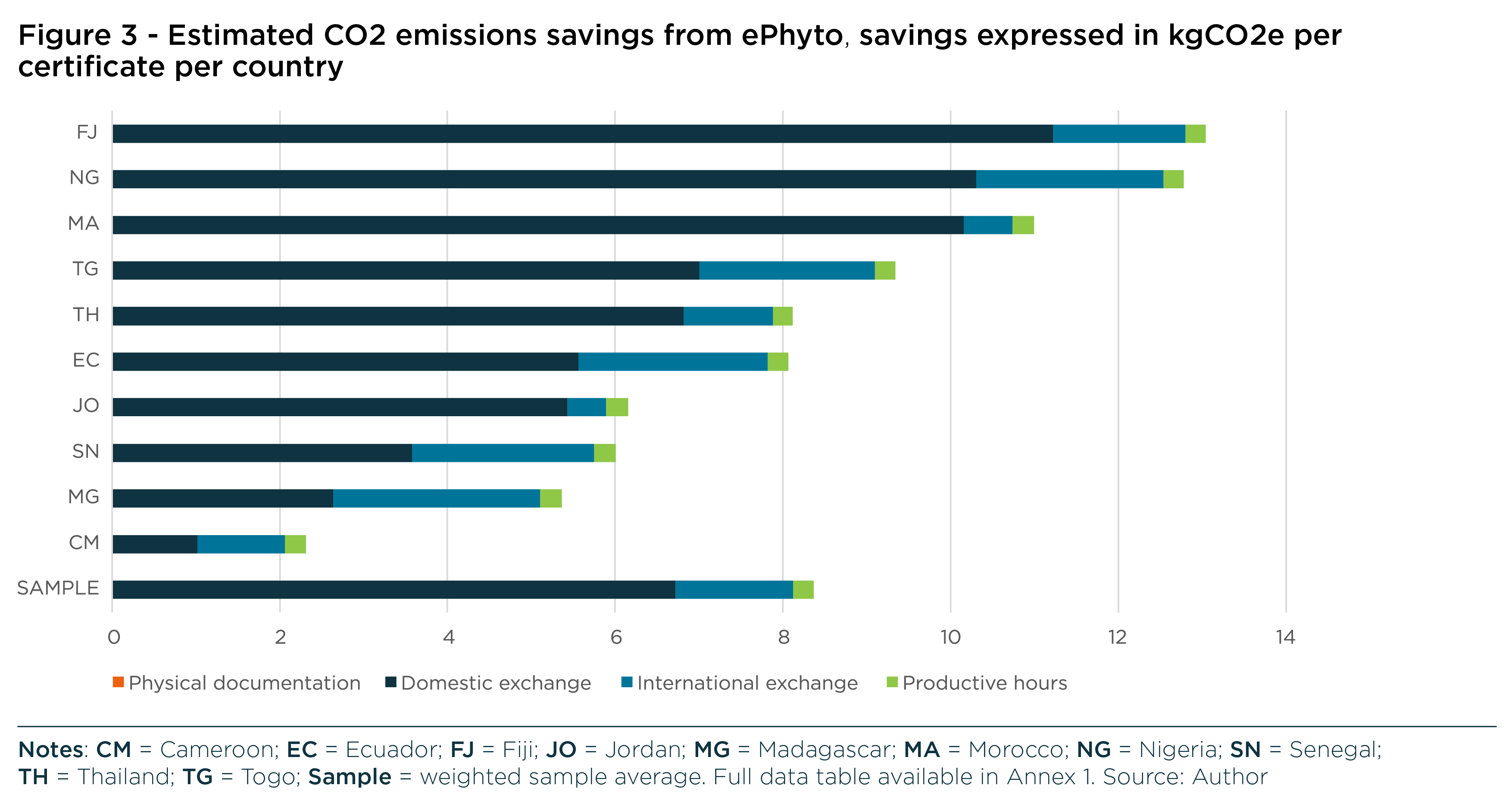- New analysis across 10 countries reveals that digitalizing phytosanitary certificates for exporting plant products can cut the carbon footprint of trade paperwork by an average of 8.4 kg CO₂ equivalent per certificate.
- Since 2018, the UN IPPC's ePhyto solution has saved an estimated 64,300 tonnes of CO₂, equivalent to the annual carbon absorption of 2.9 million trees.
- Broader emissions reduction benefits of trade facilitation and process digitalization are expected to rise, with numbers projected to reach 145,000 tonnes of CO2 by 2027 as more countries adopt the ePhyto solution.
- Follow the Sustainable Development Impact Meetings 2025 here and on social media using #SDIM25. Read the report here .
Geneva, Switzerland, 17 September 2025 - Digitalizing trade documents can significantly reduce the carbon footprint of trade processes, according to a new study by the Global Alliance for Trade Facilitation . The study, released ahead of the Sustainable Development Impact Meetings 2025, highlights that shifting from paper to electronic documents in international trade offers a practical way to contribute to achieving climate goals.
The report, Move Goods, Not Paper: Carbon impacts of digitalizing trade procedures - evidence from the ePhyto case, analyses the adoption of electronic phytosanitary certificates (ePhyto) in 10 countries: Cameroon , Ecuador , Fiji , Jordan , Madagascar , Morocco , Nigeria , Senegal , Thailand and Togo . Focusing on administrative trade procedures, and comparing the carbon footprint of paper-based versus digitalized processes, the report suggests that digitalizing trade paperwork delivers modest but measurable reductions in carbon emissions. Since 2018, the United Nations International Plant Protection Convention ePhyto solution - one of the most reliable and globally standardized digital trade tools - has saved an estimated 64,300 tonnes of CO2 equivalent, comparable to the annual carbon absorption of 2.9 million trees. Yet, only about 5% of global phytosanitary certificates - one of the many documents used in international trade - are digital, indicating the potential for further impact.
"This study shows that trade facilitation can play a meaningful role in climate action," said Philippe Isler, Director of the Global Alliance for Trade Facilitation. "By modernizing trade processes through digitalization, we can lower costs for businesses and governments while also creating opportunities to support CO₂ emissions reduction. This is one of the reasons why the alliance is working to expand its involvement in delivering impactful IT solutions."
The report indicates that each electronic phytosanitary certificate reduces the carbon footprint by an average of 8.4 kgCO2e. It also reveals that the carbon emission reductions can vary significantly between the countries as shown in the graph below. The main source of emissions reduction comes from eliminating the need for traders to submit and collect paperwork in person, which accounts for 73% of total savings. The physical travel includes the movement to government offices, often involving long distances and multiple trips. Additional benefits include reduced paper and printing, fewer courier shipments and faster, more reliable, trade processes.

"Digitalizing trade documents is a practical, scalable way to mitigate emissions and make global trade more sustainable," said the report's lead author, Jean-François Trinh Tan, Lead, Metrics and Benchmarking, Global Alliance for Trade Facilitation, World Economic Forum.
The report's co-author, Laura Gerl, Specialist, Metrics and Benchmarking, Global Alliance for Trade Facilitation, World Economic Forum, added: "However, we are likely underestimating the true impact of ePhyto on carbon emissions. We have evidence that digitalization can also improve logistical efficiency and reduce losses for perishable goods; we simply do not have reliable data to measure it for now."
If current growth continues, the ePhyto solution could save 145,000 tonnes of CO₂ by 2027. The study underscores the importance of scaling up digital trade solutions to advance sustainability and climate objectives, even when environmental benefits are not the primary driver for reform.
About the Global Alliance for Trade Facilitation
The Global Alliance for Trade Facilitation, marking its 10th anniversary in 2025, is an initiative co-hosted by the World Economic Forum, the Center for International Private Enterprise, the International Chamber of Commerce, in partnership with Gesellschaft für Internationale Zusammenarbeit (GIZ). As the only Aid for Trade initiative that explicitly pursues a public-private partnership approach to trade reform, the alliance supports low and middle-income countries in streamlining trade-related processes to move goods across their borders as quickly, safely and cost-effectively as possible.
About the Sustainable Development Impact Meetings 2025
The Sustainable Development Impact Meetings 2025 will take place from 22 to 26 September in New York, bringing together around 1,000 global leaders from diverse sectors and geographies. Held ahead of the World Economic Forum Annual Meeting 2026, these meetings are part of the Forum's year-round work to accelerate progress on sustainable development through multistakeholder dialogues and action.
Learn about the Forum's impact






